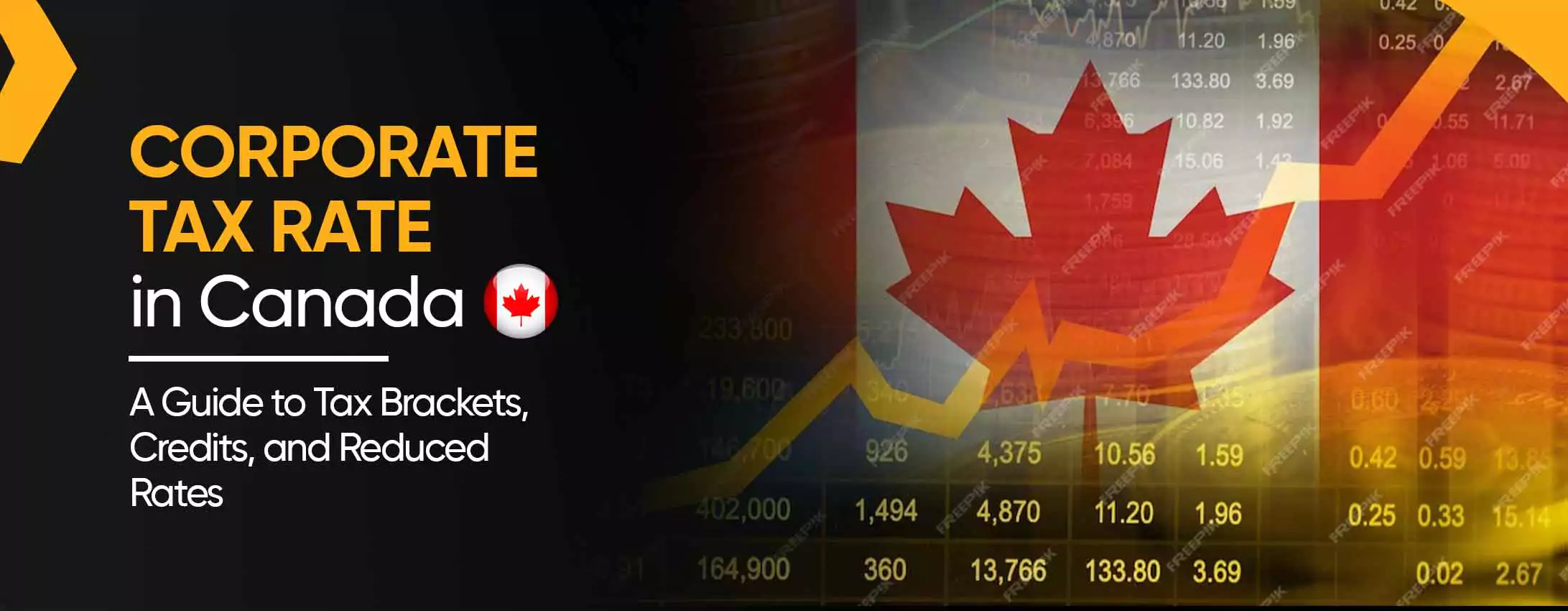Taxes are payments that individuals and businesses must make to the government. The taxes then fund public services, reduce income inequality, and influence how people and companies spend and invest. The Constitution Act, 1867 gave the federal government more taxing powers, while provinces were limited to direct taxes, such as those on income and property.
Later on personal income tax and corporate taxes were introduced in 1917 during World War I. Since then, corporate taxes have remained a key part of Canada’s tax system.
Understanding the corporate tax rate in Canada and the small business tax rate can be challenging. There are alot of factors that affect how much a business owes in taxes. But don’t worry, we will go through them with you soon.
As a business owner in Canada, you must be aware of the federal corporate tax rate, the provincial corporate tax rate, and any exemptions or deductions that might apply to your business.
In a Hurry to Know Corporate Tax Rates in Canada?
- Know Federal Rate: Pay 15% on general corporate income.
- Check Small Business Rate: Qualify for 9% as a CCPC under $500,000.
- Review Provincial Rates: Add rates like Ontario (11.5%) or Alberta (8%).
- Understand Residency: Confirm if your corporation is resident or non-resident.
- File T2 Return: Submit annually via CRA’s portal for all corporations.
- Claim Deductions: Use small business deduction or tax credits to save.
- Register with CRA: Get a Business Number for tax and GST/HST filings.
Read on to know more about federal and provincial tax rates and simplify your 2025 filings!
What is the Corporate Tax Rate in Canada?
In Canada, corporate taxes are managed by the Canada Revenue Agency (CRA) at the federal level. Think of it as the government’s way of collecting a share of business profits to fund public services like roads, healthcare, and education.
Federal Corporate Tax Rates
- General Corporate Tax Rate: The federal corporate tax rate starts at 38%, reduced to 15% after general tax reductions and abatements.
- Small Business Tax Rate: The 9% rate applies to active business income up to $500,000 for CCPCs, phasing out for taxable capital between $10M to $50M.
But wait, there is more! Canada’s corporate tax structure is not one size fits all. Each province and territory adds its own tax rate on top of the federal rate.We will discuss this in detail as well.
Provincial and Territorial Tax Rates
Most provinces and territories use a two-tiered tax system:
- Lower Rate: Applies to income eligible for the federal small business deduction. Some regions use the federal business limit (Maximum limit is $500,000), while others set their own.
- Higher Rate: Applies to any other taxable income.
What About Quebec and Alberta?
These two provinces like to do things a bit differently, they do not have tax agreements with the CRA, so their corporate tax systems run independently.
In short, if you are running a business in Canada, understanding the corporate tax rate in Canada means looking at both the federal rate and the specific rules in your province or territory.
Taxes might not be fun, but understanding them can definitely save you headaches (and dollars) in your life!
What Is The Tax Rate On Resident And Non-Resident Corporations?
First we need to understand what is a resident corporation and non resident corporation.
What is a Canadian Corporation?
A Canadian corporation is a company that meets these conditions (as defined by Section 89 of the Income Tax Act, or ITA):
- It was incorporated in Canada, or
- It has been resident in Canada since June 18, 1971.
Even if a company goes through a reorganization, it remains a Canadian corporation if:
- The reorganization happened under Canadian laws.
- All involved companies were Canadian corporations before the reorganization.
Is Your Corporation a Resident?
Tax treaties may override common-law residency, deeming a corporation non-resident in Canada.
- The CRA uses common-law principles to decide if a corporation is resident in Canada.
- Some statutory rules, called deeming provisions, clarify residency in certain cases.
A corporation can be resident in Canada without necessarily being classified as a Canadian corporation.
Resident Corporation
A corporation is considered resident in Canada for the entire tax year if:
- It was incorporated in Canada after April 26, 1965, or
- It was incorporated before April 27, 1965, and, after that date:
- It was resident in Canada under common-law principles.
- It carried on business in Canada.
If a corporation doesn’t meet these deemed residency rules, it might still qualify as resident in Canada under common-law principles.
Common Law Rules for Residency
Under common law, a company is usually considered resident in the country where its central management and control happens. In simpler terms, it’s where big corporate decisions are made.
Non-Resident Corporation
Sometimes, a corporation may qualify as resident in Canada under the ITA but is treated as non-resident under a tax treaty between Canada and another country.
In such cases, Subsection 250(5) deems the corporation non-resident in Canada despite its common-law residency status.
Tax Filing Requirements for Non-Resident Corporations
If you’re a non-resident corporation and you:
- Conduct business in Canada.
- Sell or dispose of taxable Canadian property (TCP).
Then, you must file a T2 Corporation Income Tax Return with the Canada Revenue Agency (CRA), even if your profits are exempt under a tax treaty.
a. Claiming Tax Treaty Exemptions
To claim a tax treaty exemption, you need to:
- Complete Schedule 91: Information Concerning Claims for Treaty-Based Exemptions.
- Attach Schedule 91 to your T2 return.
b. Schedule 97: Additional Information for Non-Resident Corporations
If you’re a non-resident corporation filing a T2 return, you must also complete and submit Schedule 97 to provide extra details about your activities in Canada.
Withholding Tax on Non-Resident Corporations
A 25% withholding tax applies to non-resident corporations for services in Canada, reduced by tax treaties (e.g., 15% for US firms).
- This tax is deducted at the source by the payer.
- The withheld tax is considered a prepayment towards your Canadian tax liability.
To settle your final tax bill or claim a refund of any excess amounts, you must file a T2 return with the CRA.
Payroll Deduction Accounts for Non-Residents
If a non-resident corporation:
- Hires employees in Canada.
- Pays non-resident subcontractors.
You’ll need to set up a Payroll Deduction Account with the CRA. This ensures proper income tax, Canada Pension Plan (CPP), and Employment Insurance (EI) deductions are made.
Business Number (BN) and Corporate Tax Registration
All corporations operating in Canada must register with the CRA and obtain a Business Number (BN).
- The BN must be included on your T2 return and all CRA correspondence.
- GST/HST registration is required if taxable supplies exceed $30,000 annually.
Filing corporate taxes in Canada can be tricky, but it doesn’t have to be.
Whether you’re a resident or non-resident corporation, Bestax makes it easy. Contact us now so you can focus on your business only.
Ontario Corporate Tax Rates
Business tax rates in Ontario vary based on the type of business and income level. Here’s a simple breakdown:
| Period | General Corporate Tax Rate | Small Business Tax Rate (SBD) |
| July 1, 2011 – Present | 11.5% | 3.2% (from Jan 1, 2020) |
| Jan 1, 2018 – Dec 31, 2019 | 11.5% | 3.5% |
| July 1, 2010 – Dec 31, 2017 | 12.0% | 4.5% |
| Before July 1, 2010 | 14.0% | 5.5% |
- Small Business Deduction (SBD): Applies to the first $500,000 of active business income for Canadian-Controlled Private Corporations (CCPCs).
- For taxable capital between $10M and $50M, the small business deduction starts to phase out.
- If taxable capital exceeds $50M, the reduced tax rate no longer applies.
Ontario Tax Brackets
- 2025 Update: Ontario tax brackets and personal tax credit amounts will increase by 2.8% (indexation factor: 1.028) except for the $150,000 and $220,000 brackets, which remain unchanged.
- Federal Update (2025): Federal tax brackets and personal tax credit amounts will increase by 2.7% (indexation factor: 1.027).
- For more details on Capital Gains Inclusion Rate Changes, refer to the Canada Federal Personal Tax Rates page.
British Columbia Corporate Tax Rates
British Columbia keeps it straightforward with two main rates:
| Tax Rate | Applicable Income |
| 2% | Income under the $500,000 small business limit |
| 12% | Income above the small business limit |
- Use Schedule 427 to calculate your taxes.
- No need to file it separately – just keep it for your records.
Alberta Corporate Tax Rates
| Effective Dates | General Rate | Small Business Rate | Annual Business Limit |
| July 1, 2020 – Present | 8% | 2% | $500,000 |
| Jan 1, 2020 – June 30, 2020 | 10% | 2% | $500,000 |
| July 1, 2019 – Dec 31, 2019 | 11% | 2% | $500,000 |
| Jan 1, 2017 – June 30, 2019 | 12% | 2% | $500,000 |
| July 1, 2015 – Dec 31, 2016 | 12% | 3% | $500,000 |
Small Business Threshold: $500,000 annual income limit applies.
Key Takeaways for Corporate Tax Rate in Canada
- Ontario: General rate is 11.5%, small business rate is 3.2%.
- British Columbia: General rate is 12%, small business rate is 2%.
- Alberta: General rate is 8%, small business rate is 2%.
Each province has slightly different rules around taxable capital, deductions, and eligibility for reduced rates.
Understanding the corporate tax rate in Canada helps businesses make better financial plans and take advantage of regional tax benefits.
If you have specific questions or need help calculating your taxes, feel free to ask us!
Simplify Your Corporate Taxes with Bestax!
Taxes don’t have to be stressful. At Bestax, we simplify the process so you can focus on growing your business.
From accounting services to corporate tax services, we help you minimize your taxable income and keep more of your profits. Whether you’re a Canadian-controlled private corporation (CCPC) or managing income across provinces, our expert team provides reliable support—right here in Toronto and across Canada.
Let’s take the stress out of taxes. Get in touch with Bestax today!
Frequently Asked Questions
How can I reduce corporate tax in Canada?
Claim the Small Business Deduction, grab tax credits, and keep income under $500,000 as a CCPC. No-brainer way to save big!
What’s the corporate tax rate in Canada?
Federal rate is 15% (general) or 9% (small biz). Provinces add on: Ontario 11.5%/3.2%, BC 12%/2%, Alberta 8%/2%.
What’s the general rate reduction for corporate tax in Canada?
Federal tax starts at 38%, slashed to 15% after reductions. Provinces pile on their rates.
What’s the BC corporate tax rate?
BC taxes at 2% for income under $500,000, 12% above. Stay low to dodge the big hit!
How much corporate tax do I pay in BC?
Pay 2% on income below $500,000, 12% on anything over. Keep it tight to avoid CRA’s hot water!
Does Canada have low corporate tax?
Canada rates beat many G7 countries. Alberta’s 8% general rate is a total game changer in North America!
When is the T2 return due in Canada?
Six months after your fiscal year end, file fast to steer clear of CRA hefty fines!
Do I need GST/HST registration?
If your sales top $30,000 a year. It’s a no-brainer for compliance!
Disclaimer: The information provided in this blog is for general informational purposes only. For professional assistance and advice, please contact experts.




